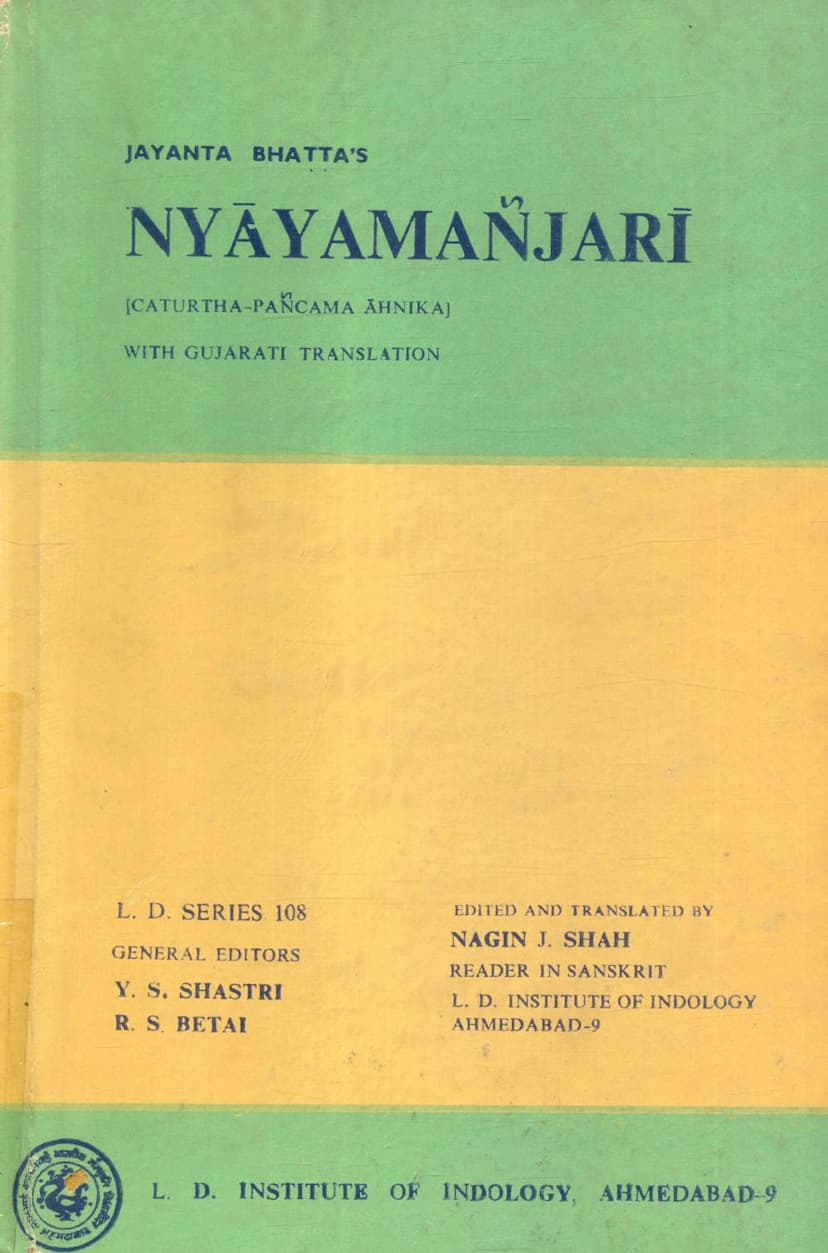Nyayamanjari Ahanika 04 05
Added to library: September 2, 2025

Summary
This is a comprehensive summary of the provided Jain text, focusing on the content of Nyayamanjari's Fourth and Fifth Ahnika, edited and translated by Nagin J. Shah.
Book Title: Nyayamanjari Ahanika 04 05 Author(s): Jayant Bhatt Publisher: L D Indology Ahmedabad Editor & Translator: Nagin J. Shah
General Overview:
The provided text contains the Fourth and Fifth Ahnika (sections) of Jayanta Bhatta's Nyayamanjari, a significant work in Indian logic, particularly within the Nyaya school. The text, as presented, includes a Gujarati translation, suggesting it's a scholarly edition aimed at Gujarati-speaking audiences interested in Indian philosophy. The Foreword by Y. S. Shastri highlights Jayanta Bhatta's status as a first-rank thinker, his work's intellectual height, and his critical engagement with Mimamsaka and Buddhist schools of thought.
Summary of Contents:
Fourth Ahnika:
This section primarily focuses on refuting the Mimamsaka doctrine of the impersonality (apauruşeyatva) of the Vedas and discusses the relationship between words and their meanings. Key themes and arguments include:
- Refutation of Mimamsaka's Impersonality of Vedas: Jayanta Bhatta argues against the Mimamsaka view that the Vedas are authorless. He presents the argument of "createdness" (kratakatva) as a logical reason to prove the existence of a creator for the Vedas, drawing parallels with human compositions like Kumarasambhava. He systematically examines and refutes the reasons provided by Mimamsakas to establish the uncreated nature of the Vedas, such as the argument based on "prior study by a guru" (gurvadhyayanapurvakatva) and "unremembered author" (asmariyamanakarta).
- Authoritativeness of Atharvaveda: Jayanta Bhatta vehemently defends the authoritativeness of the Atharvaveda and argues for its supremacy among the four Vedas. He addresses the argument that the Atharvaveda is "outside the trinity" (trayibahya) and establishes its validity through various textual references and logical reasoning. He counters the claim that its perceived differences from the other Vedas disqualify it, arguing for the authoritativeness of all types of Agamas, including those of the Bauddha, Jaina, Saiva, and others.
- Authoritativeness of Various Agamas: Jayanta Bhatta extends his defense to the authoritativeness of all Agamas, citing common ground in their ultimate goal (moksha as the objective) and the means to achieve it (knowledge). He points out that despite variations in the content of knowledge or practices, the core principles of liberation and knowledge remain consistent across different traditions, including Sankhya, Buddhism, and Vedic scriptures.
- Relationship between Words and Meanings: Jayanta Bhatta discusses the Mimamsaka theory of the relationship between words and meanings, particularly their concept of shakti (inherent power). He refutes the idea of a nitya sambandha (eternal connection) between word and meaning, arguing against the Mimamsaka concept of shakti itself and proposing samketa (convention or indication) as the basis for linguistic understanding, attributed to God.
- Critique of Buddhist Doctrines: The text also touches upon the refutation of Buddhist doctrines like kshanabhangavada (momentariness), apoha (exclusion), and Isvarabhanga (denial of God).
Fifth Ahnika:
This section delves into linguistics and epistemology, discussing concepts crucial for understanding language and reality from a Nyaya perspective:
- Jati (Universal): A significant portion deals with jati (universal or genus). Jayanta Bhatta establishes the reality of jati and discusses its relationship with vyakti (particular) and akriti (form/shape). He engages in a debate with Buddhist philosophers, particularly refuting the doctrine of apoha (exclusion) as the basis for meaning. He argues that universals are real and are the objects of our cognition when we understand commonality across particulars.
- Akriti (Form/Shape): The text examines the concept of akriti, distinguishing it from jati. While jati refers to the universal essence, akriti pertains to the specific form or configuration that makes a thing recognizable as belonging to a particular category.
- Padartha (Meaning/Thing): The discussion touches upon padartha, the categories of reality, which are fundamental to Nyaya epistemology.
- Vakyartha (Meaning of a Sentence): A substantial part of this Ahnika is dedicated to analyzing vakyartha, the meaning of a sentence. Jayanta Bhatta refutes various theories on sentence meaning, including those that emphasize the role of vyavachheda (distinction), samsarga (relation), kriya (action), phala (result), purusha (person), bhavana (mental act), vidhi (injunction), nigama (conclusion), udyoga (effort), and pratibha (insight). He ultimately establishes the Nyaya view that vakyartha is the collection of samsṛṣṭa padārthas (related meanings), meaning the sentence conveys the meaning of the individual words in their relational context, rather than being something entirely separate from the words themselves.
Overall Significance:
The Fourth and Fifth Ahnikas of Nyayamanjari, as presented in this edition, are crucial for understanding Jayanta Bhatta's comprehensive philosophical system. They showcase his rigorous dialectical approach in defending Nyaya tenets against prominent opposing schools like Mimamsa and Buddhism, while also offering profound insights into the nature of language, meaning, and reality. Dr. N. J. Shah's Gujarati translation is highlighted as a successful effort to maintain the original spirit of the text, making it accessible to a wider audience.